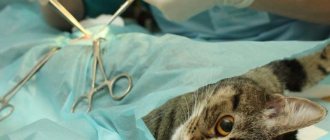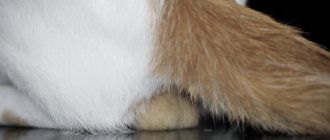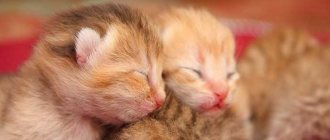According to veterinarians, chicken and quail eggs are beneficial for cats if consumed in moderation and heat-treated. Cat owners need to take into account that some pets may have an allergic reaction to the protein component of the product. If the animal's diet is rich in minerals, then before including eggs that contain high doses of Ca, you need to check the optimal amount with your doctor.
Composition and benefits of eggs
The egg contains more than a dozen vitamins: A, C, D, E, K, B vitamins: B1, B2, B6, B9, B12, as well as microelements: calcium, potassium, zinc, magnesium, iron, phosphorus, sodium and many others necessary for the health of the cat.
The egg white contains a source of easily digestible protein. The yolk is rich in fat-soluble vitamins and choline, which controls fat and cholesterol levels in the body. Lecithin has a positive effect on blood supply to the brain. Egg yolk also contains cholesterol, which is considered the least harmful due to its balance with lecithin, which has a positive effect on the nutrition of nerve cells and is necessary for proper blood supply to the brain.
Eggs contain a lot of nutrients
Which is healthier: boiled or raw product for pussy?
There is no definite answer to this question. Remembering the wild origin of cats, they are, in theory, adapted to eat raw food, and their body must be prepared for this.
But still, Murka and Vaska are by no means “savages”; they have been pets for many centuries and have adapted to a new way. They live side by side with humans and often eat foods that they cannot get in the wild. Moreover, pets often “treat” themselves, without waiting for the generosity of the owner. Even some human diseases can be transmitted to cats... And many breeds have undergone long-term selection, but there is no need to remember their “wild” roots.
All this leads us to believe that it is better to boil your pet’s eggs to avoid digestive problems. After all, raw ones may contain helminth larvae, including worms, and this is in addition to salmonella.
Veterinary specialists, who know the danger of infection and the possible consequences, recommend once again to be on the safe side. Although, as in other products, the amount of nutrients in eggs decreases when cooked. The product can be given whole or finely chopped; the latter serving option is more preferable.
Eggs in the diet of cats
Rich in vitamins, eggs are an essential element of proper cat nutrition. As a rule, they are part of premium professional feeds. In the case of natural feeding, the owner must add them independently, observing the proportions, restrictions and other features of the product.
Veterinarians agree that eggs that have not undergone heat treatment are prohibited for cats. They can become a carrier of salmonella, which is neutralized by high temperatures during cooking. Slightly undercooked so-called poached and benedict are also contraindicated.
Boil eggs for at least five minutes and serve without salt. In this case, the danger of harm to the animal will be prevented, and the beneficial properties will be obtained to the maximum.
Raw eggs can cause salmonellosis
What are the benefits of eggs for a cat?
For carnivorous animals, namely domestic cats, their diet should consist overwhelmingly of protein. The source of protein is mainly meat and fish, but they are not the only ones that should make up a complete diet.
Eggs provide the body not only with protein, but with important amino acids that strengthen the cat’s immunity, prevent cardiovascular diseases, and sharpen vision.
Eggs contain vitamins and a number of essential minerals: iron, calcium, magnesium, potassium. They are good for joints and muscles, bones, and strengthen the nervous system. When combined with vitamin D, calcium maintains healthy teeth. Biotin, which is abundant in eggs, has a positive effect on the condition of the coat.
It is not obvious, but eggshells are no less useful than whites and yolks. It contains a whole complex of minerals. The shells must be washed in running water and poured with boiling water, and added to food in a highly crushed form.
Cats with chronic diseases should not eat eggs
Eggs are harmful to cats
When choosing food for cats, you should take into account what they eat in the wild. Cats belong to the order of carnivores, which means that the basis of their diet is animal products rich in protein. A wild cat hunts birds, small rodents, and can also destroy bird nests and eat eggs. Therefore, eggs added to the diet in small quantities do not cause any harm to the cat’s body.
Eggs, like any product, can cause allergies and individual intolerance. In case of allergies, skin rashes and itching, diarrhea and vomiting may occur.
In addition, store-bought eggs may contain an antibiotic that is given to chickens. It negatively affects the immune system of cats and disrupts the functioning of internal organs.
Quail eggs are easier to digest in the body
Chicken or quail eggs
There is an opinion that quail eggs are more beneficial for cats, that they are richer in protein, strengthen the immune system and help get rid of diseases. In fact, quail eggs are slightly superior in health benefits to chicken eggs. The advantage of quail eggs is that they are actually better absorbed in the cat’s body.
It is a mistake to think that due to the high body temperature of quails, their eggs cannot contain salmonella, but this is not the case. Research has revealed the presence of bacteria on the inside of eggshells. Therefore, it is better to feed your cat a product that has undergone heat treatment.
Quail or chicken?
Quail eggs have become fashionable. They are recommended to everyone: both people and animals. How is it really? Let's look at popular myths.
1. Quail is healthier than chicken.
True, but there is almost no difference. If you are choosing between homemade chicken and store-bought quail, then choose the first. It's good if your friends or you have your own small farm. You will know for sure that the birds are healthy.
2. It is better to give cats quail eggs.
This is also true, but you shouldn’t deify the product too much. Quails are digested a little better. This is where the benefits end.
3. Quails cannot carry salmonella.
Myth. Don't trust cunning marketers. Only heat treatment will help prevent the disease.
4. Quail are hypoallergenic.
Myth. The product may well cause individual intolerance. It usually occurs after eating a large number of eggs one time. You can keep purr safe by limiting portions.
The only undeniable advantage of quails is their size. If your cat is suddenly not in the mood, you will put less food in the trash.
How much and how often to give your cat an egg
Not a single product will be beneficial if you feed your pet only it. This also applies to eggs in a cat’s diet.
Much depends on the individual, but on average an adult cat can eat one whole egg per week. It is better to divide this amount into several feedings. Even if your pet eats eggs with pleasure, limit the amount of this product. In large quantities, eggs can negatively affect a cat's liver, gall bladder and other internal organs.
For kittens who are starting to switch to a natural diet from mother's milk, a fifth of one chicken yolk per week would be close to the ideal amount. As it grows, the portion can be increased to a third and ½ part of the yolk. The yolk of a quail egg will not harm the kitten in its entirety, but also not more than once every seven days.
Eggs are good for kittens too
Give preference to yolk or white
Both raw and cooked products contain useful components - avidin (glycoprotein) and vitamin B7 (biotin), which have a positive effect on the pet’s coat. With enough of it, the fur becomes smooth, shiny, and the cat looks beautiful and well-groomed.
Another controversial question: should a cat be given the whole egg or just parts of it? Are yolks or whites healthy? Many believe that since the yolk does not contain avidin, which interferes with the absorption of vitamin B7, then it is better to give it to your pet. Quite often it is given separately, mixed with cow's milk.
But not everyone agrees with this; some owners prefer to give both the white and the yolk at the same time, but first beat them into a homogeneous mass. There is no consensus on this aspect.
When should you start introducing eggs into your diet?
If you have adopted a kitten or become the owner of a cat that has recently given birth, difficulties may arise with the choice of food, in particular, whether a small kitten can be given a raw or boiled egg.
Adult and young cats should not eat raw eggs due to the risk of salmonellosis. Boiled eggs do not harm the body of a healthy animal. Kittens up to six months are recommended to consume no more than a quarter of one chicken or whole quail yolk no more than once a week.
It is recommended to feed babies eggs no earlier than they reach three months of age.
Do you need to cook?
A good option is to offer your pet boiled eggs . They can be mixed with meat or cottage cheese if he refuses the product in its “pure” form. It is not recommended to give fried eggs in oil to cats. The best option would be to pamper your cat with a steamed omelette without adding salt. To make it fluffy and tasty, add warmed milk while whipping.
Under no circumstances should cats be offered raw eggs! They may contain E. coli, which will lead to inflammation of the pancreas. In their raw form, they are very poorly digestible. Crude protein can remove a number of vitamins from the body, and leads to their deficiency, even if the cat’s nutrition is complete. Raw yolk is considered healthy, but only from homemade and fresh eggs.
Important! Quails should also not be offered raw to cats, because there may be bacteria on the shell and inside that can lead to very dangerous diseases.
Boiled eggs are no less dangerous for animals than raw eggs. They need to be cooked for at least four minutes, because the causative agents of salmonellosis die only at high temperatures. In this case, you can be sure that your pet will eat a safe product that will not cause any harm.
Contraindications
Eggs, like any other product, can cause intolerance or allergies .
Therefore, the diet should be supplemented gradually, monitoring the appearance of changes in the animal’s skin and the reaction of the gastrointestinal tract, which may react with vomiting or diarrhea.
Also, in the presence of certain chronic diseases in cats, eggs can cause a sharp deterioration in health.
- Eggs increase blood cholesterol, this can be a critical factor for cats experiencing problems with the cardiovascular system , this is especially true for older animals.
- kidney, liver or gall bladder diseases, it is better to avoid eating eggs to avoid complications.
- for cats suffering from urolithiasis .
You should consult with your veterinarian before introducing any product into your diet, especially if your pet suffers from chronic diseases of the internal organs or does not tolerate certain types of food.
Also, be careful when feeding eggs to pregnant and lactating cats; it is best to do this under the supervision of a doctor.
Some animals enjoy eating eggs
For whom eggs are contraindicated?
Some cats have an individual intolerance to egg whites, and eggs cause allergic reactions in them. Allergy symptoms include itching, swelling, and rashes can be observed around the ears and face. Possible vomiting and intestinal upset. In these cases, chicken eggs should not be given to the cat. Quails are also allergic, so the ban applies to them as well.
Raw eggs (especially white eggs) should not be fed to pregnant or lactating cats; eggs should be added to the diet of animals suffering from liver and kidney pathologies, chronic heart and vascular diseases with extreme caution. If possible, it is better to exclude them from the diet.
The yolks of chicken and quail eggs are strictly prohibited for animals with urolithiasis.
You need to be careful when giving industrially produced eggs to cats - at some poultry farms, chickens may be given antibiotics to protect them from infectious diseases. With eggs, antibacterial additives can enter the animal’s body, where they can reduce the functions of the immune system and cause improper functioning of internal organs.
It is recommended to consult a veterinarian before formulating a diet. Before adding eggs to your pet’s food, it is advisable to get tested for the content of vitamins in its body.
How to train a cat to eat eggs
Cats often eat eggs with pleasure, guided by instincts. But it happens that some individuals do not like this product, then the owner has to resort to some tricks.
A boiled egg can be added to your usual diet in finely chopped form. And since it is recommended to eat a small amount of egg at one meal, the cat may not pay attention to its presence on the menu.
If your pet is used to eating store-bought food, study its composition: many manufacturers add eggs to the finished product. Otherwise, you can add a little boiled egg to dry food or canned food.
So, a small amount of chicken or quail eggs will not harm the cat unless there are medical contraindications for this. If in doubt, it is better to consult a veterinarian and undergo the necessary tests. Then you will be confident that you are ensuring the well-being and health of your pet.
Egg dishes
Pets enjoy eating steamed omelettes. You need to add a little milk to the egg. Spices are not added to the dish. Fat is also contraindicated.
Boiled eggs are healthy, nutritious, and desirable on a cat’s menu. They can be served along with porridges and vegetable purees. But you should avoid fried eggs. They do not benefit the animal's body.
Standard cat diet
Everyone knows that cats are carnivorous animals, that is, it is normal for them to eat meat. In nature, animals do not prepare their own food, they eat what they managed to catch along with wool, bones and entrails. If we are guided by this argument, then all the rules for keeping pets will lose their relevance.
The truth is that our domestic cats have long moved away from wild ways of life, although they have retained excellent hunting skills. As before, tailed animals need meat, but in addition to it, cats can receive a number of varied, tasty foods, vitamin supplements, treats and industrial food.
Industrial diet
Let's briefly look at industrial feeds. The option preferred by many is “drying”. There is no doubt about it, dry food is convenient, easy to store, dose, and most importantly, there is no need to prepare it. In addition to drying, manufacturers offer semi-moist food and canned food that can diversify your pet’s diet.
When choosing food, it is important to understand that products are divided into classes:
• Economy is the cheapest food, not recommended for daily use.
• Premium and super-premium – the middle price segment for everyday feeding.
• Holistic – special or medicinal foods used for urolithiasis (urolithiasis), food allergies and other ailments.
The choice of brand, line and type of product is an individual matter. Naturally, it is better to focus on manufacturers with a good reputation and products of original quality. What you should not do is mix industrial food with natural food. If you decide to feed your cat chicken and dry food, you will not see particularly serious consequences, at least not immediately. However, be aware that you are putting your cat's body at a crossroads. Her digestive system can digest either food or chicken, but cannot digest two foods at the same time. It turns out that the pet will not be able to absorb all the beneficial substances from the food, but will simply fill its stomach.
Natural diet
Chicken meat is combined only with a natural diet. Obviously, chicken meat alone will not be enough for a cat. Chicken can and should be alternated with beef, veal, rabbit, quail and turkey. Equally important are by-products that complement and do not replace meat. What other products should be included in the menu?
The protein a cat gets from chicken is not enough, so other sources of protein should be included in the diet:
Milk is suitable for kittens and adult animals that do not have lactose intolerance.
Dairy products (ryazhenka, yogurt, natural yogurt, low-fat sour cream, kefir) can be given every day, controlling the fat content of the products. Homemade products are healthier, but fattier, that is, they need to be introduced into the cat’s diet gradually.
Eggs – boiled and raw, chicken and quail. Possible 1-2 times a week. Some cats have allergies, in which case the product is excluded from the diet. Raw eggs can be given to your pet if you are confident in their quality and freshness.
Fish and seafood are rich sources of proteins and microelements and at the same time very controversial products. Sea delicacies can serve as a source of helminth eggs. Inhabitants of the seas often carry not eggs, but worm larvae ready to molt. River varieties of fish are especially dangerous. Nutritious and healthy fish are dangerous due to bones that scratch and even pierce mucous membranes
Be careful to feed your cat only ocean, boiled, and deboned foods.
Vegetables and greens are an integral part of a cat's natural diet. In addition to vitamins, these products contain fiber
Without plant food, a cat's digestive and metabolic processes are disrupted, that is, even meat will not be fully digested.
Chicken VS quail
In recent years, quail eggs have been actively recommended to absolutely everyone, calling them almost a panacea for any disease. Of course, this is a myth - eggs alone cannot cope with the disease, no matter how much we are convinced of their benefits. Quail eggs are only slightly superior to chicken eggs in terms of nutritional value, but quail eggs are slightly healthier for cats than chicken eggs, as they are better and faster digestible. Of course, a homemade chicken egg will be more beneficial than a store-bought quail egg.
Attention! Both chicken and quail eggs can cause allergies and intolerances. Like chicken eggs, quail eggs can contain the causative agent of salmonellosis. All the stories about the elevated temperature of quails and their immunity to salmonella infection are a myth dangerous to health and life. Therefore, the answer to the question “Can a cat have a raw egg?” obvious - no, if you do not want to endanger your pet, yourself and your family.
If the cat turns up his nose
Just like people, cats have their own food preferences. And if you can’t pull some people away from this dish by the ears, others turn their noses up at it. The thing is that eggs have virtually no odor, so the cat may not pay much attention to them. You can help your pet recognize it by gently poking its nose at the product, thus showing that this food is completely safe and edible.
If this fails to convince the cat, then there is no need to insist. This means that the pet simply does not like eggs and it is worth looking for another way out of this situation. For example, a new product can be “camouflaged” by taking advantage of the fact that animals react to the aromas of the dish rather than its appearance. The egg can be grated and added to your usual dishes.
Some cats have a weakness for fried eggs. Of course, this is not the healthiest dish, since the presence of overcooked butter will not improve the health of the animal, and the owners are unlikely to prepare it separately for their purring gourmet, however, occasionally the pet can still be pampered.
In addition, you can give eggs with your favorite treats; your pet will hardly be able to resist. They can be mixed with minced meat, pieces of fish, liver or other product that the cat is partial to.
How to collect cat paws
Only the above-ground part of this herb can be used for medicinal purposes. Its collection is carried out taking into account the timing of flowering and ripening. As already mentioned, it usually blooms in mid-May and continues to bloom until the end of July, while its fruits appear in July-August.
The stems, leaves, and flower baskets, which can only be collected during flowering, have medicinal properties. If you couldn’t keep the basket intact, you can dry individual flowers. As a rule, medicinal raw materials are dried naturally in the fresh air. But it is necessary to equip a small canopy for this. The shelf life of this raw material is short, only a year.
Another thing is the above-ground part, collected before the flowers bloom. Such stems, leaves and buds contain all useful substances in higher concentrations. The medicinal raw materials are dried under canopies, as in the first case. But it can be safely stored for 3 years.
You can only collect the grass itself, that is, stems and leaves, without buds, baskets or flowers. Such raw materials are collected until the buds open. Dry it outdoors in the shade or indoors (the main thing is that it is well ventilated). The shelf life of raw materials is 1 year. In general, it is better to store such herbs in paper or fabric bags or cardboard boxes pre-lined with paper.
Is it possible to give eggshells to cats?
Eggshells contain a whole range of useful minerals. It has a beneficial effect on the condition of bone tissue in cats. But it can be given to pets only after consultation with a veterinarian. If the animal suffers from urolithiasis or is prone to it, it is better to refuse eggshells. Otherwise, your pet's condition may worsen.
Eggshells are offered to pets in a well-crushed form. It can be given no more than 3 times a week. A pinch of eggshell powder can be added to the animal's food.











